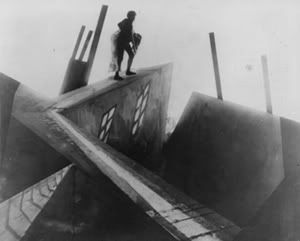 |  |
A recent program on Television Ontario's news/current Affairs program The Agenda had a panel discussion it titled as "Zombie Zeitgeist" and had zombie experts from various universities as guest on its panel. Here is the link to the video. It is astonishing how seriously they all take the topic, including the usually sharp and adroit host of the program Steve Paiken.
I noticed this foray into the "unreal" with two films that Leonardo DiCaprio made, in quick succession just last year: Shutter Island and Inception. DiCaprio's characters enter some abyss (in Shutter Island we find out that he's actually mad) where the laws of reality (including gravity) don't exist, or at least they don't fully and consistently exist.
The main character in a recent film The Black Swan (after the character in the ballet Swan Lake) delves into what seems like voluntary madness to cope with the difficult and exacting world of ballet. Natalie Portman's black swan Nina Sayers, is faced with a competitor who might take her role away from her, and of course the lime light too. Her isolated narcissistic self cannot accept this.
What is intriguing about these films is that they're not truly "horror" films, in the tradition of Carrie or The Exorcist, but "cop out" films In Carrie, there is an alien, evil, force which takes over and inhabits Carrie's her body. In The Black Swan, Nina willfully succumbs to her inner evil. Contemporary film characters are simply withdrawing from the world, by imagining the worst (or their rendition of the worst, since it is all in their imagination after all), and living in that constructed (inner) reality.
German cinema between the two world wars had large numbers of horror-type films. The Germany of that period was undergoing a serious decline in national identity and pride. WWI was a disaster for the German psyche, and the high unemployment rates that resulted dampened materialistic realizations. And the German were losing ground on their greatness to the formidable Americans across the Atlantic.
German filmmakers were producing films that are now considered part of Germany's artistic heritage - they still had to produce the best of the worst! The protagonists in these films did not only remove themselves from life, but constructed parallel worlds, replete with architectural and cultural idiosyncrasies, in which they maneuvered, alone and unaided, labyrinths of hostile environments. This is what Nina in The Black Swan is doing. Rather than an alien force taking over her body and psyche, it is her deranged inner life that distorts her hold on reality. Nina has constructed her own evil, has given up fighting (or simply refuses to accept her fate), and tries to resolve her pain in her own, aggressively self-pitying way.
To tie together zombies, deranged and narcissistic personalities, and German post WWI society, they all reject reality and construct their own worlds, often through psycho-social separation, or eventually through outright destruction of the current world to build their own superior reality (in the case of the Nazis who developed out of the individualized narcissists that preceded them).
But all these constructions are essentially nihilistic - their structures haven't proven to be long-lasting, and they discard the wisdom, goodness and transcendence that preceded them. Building out of nothing (which is very hard to do, and all these groups still have no choice but to latch on to some things that came before, even if it is to have solid roofs above their heads) only gives back nothing.
This is a long post, and I should try to come up with an underlying idea that might "solve" all this propensity towards Armageddon. I think the problem is, and I mention it briefly here, a lack of the sacred, the sacrosanct. And specifically, a rejection of the Christian God, that leads to the evil that all these films envelop. The Devil is always waiting, patiently and ruthlessly. He must be having a field day in our twentieth century epoch.